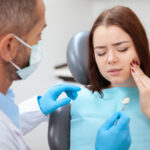A professional dental cleaning is an important aspect of having good oral health. Routine dental cleanings help ward off cavities, gum disease, and various other oral health problems. Whether you are going to a dentist in Kelowna for the first time or you’re a frequent patient, knowing what to expect during a dental cleaning visit can put your mind at ease. We will guide you through the process of a teeth cleaning appointment and why it’s so important to your overall oral health.
Why Are Dental Cleanings Important?
Before jumping into the steps of a teeth cleaning appointment, let’s briefly cover why cleanings are so important:
- Prevent Cavities and Gum Disease: Cleaning breaks down and removes plaque and tartar, both of which cause cavities and gum disease most often.
- Brighten Your Smile: Cleanings eliminate surface stains that occur as time goes by, resulting in a cleaner, whiter smile.
- Total Wellness: The condition of your mouth directly affects your overall health. Maintaining a clean mouth can help avoid problems such as heart disease, diabetes, and others.
The Initial Examination
To start, your dentist or hygienist will perform a quick oral examination. This is a necessary first step to make sure your gums and teeth are healthy.
- Visual Inspection: The dentist will look for cavities, gum disease, or other possible problems.
- X-Rays: Depending on how long it’s been since your last checkup, your dentist may take X-rays to see if there are issues beneath the surface, such as cavities between your teeth or loss of bone.
Removing Plaque And Tartar
One of the most important parts of the professional teeth cleaning process is getting plaque and tartar off your teeth. Here’s what they do:
- Ultrasonic Scaling Tool: Your dentist or hygienist will use an ultrasonic device to dislodge the plaque and tartar. The vibrating device loosens stubborn plaque, while a stream of water flushes away the loosened debris. You will hear buzzing, but it is completely painless.
- Hand Scaling: Once the ultrasonic is done, your dentist will employ small hand instruments known as scalers to take out any remaining plaque or tartar between your teeth and along your gum line.
Polishing Your Teeth
Once plaque and tartar are cleared away, the next step is to polish your teeth. This leaves your teeth smooth and shiny.
- The Polishing Paste: Your hygienist will apply a gritty, flavored paste and an electric brush that is specifically designed to polish your teeth. This removes surface stains and makes it more difficult for plaque to adhere to your teeth in the future.
- Flossing: Your hygienist will floss between all of your teeth, clearing away any remaining debris and ensuring that there are no buried particles between your teeth.
Fluoride Treatment
After polishing. Fluoride strengthens your teeth and prevents decay.
- Fluoride Treatment: Your dentist will apply a fluoride gel or foam using a tray that’s shaped to fit over your teeth, helping to strengthen enamel and prevent decay. Bite down for a few minutes to allow the fluoride to take effect.
- Fluoride Varnish: Sometimes, a light layer of fluoride varnish is applied directly to your teeth using a tiny brush. It’s quick and efficient at strengthening enamel and guarding against cavities.
Post-Cleaning Advice
Once the cleaning is finished, your dentist or hygienist will offer some advice to help you maintain your oral health between visits.
- Brushing and Flossing: You’ll be encouraged to brush twice daily and floss every day to maintain optimal oral hygiene. Maintaining good at-home oral hygiene is key to keeping your smile healthy.
- Dietary Tips: Your dentist may recommend avoiding certain foods or drinks, such as sugary snacks or acidic beverages, to maintain the health of your teeth.
- Follow-up Care: Depending on your oral health, your dentist may suggest a follow-up appointment or extra treatments, such as a deep cleaning, if gum disease or other issues are detected.
What to Expect After Your Dental Cleaning?
Many patients wonder if they will experience discomfort after a cleaning, and the good news is that the process is generally pain-free. However, some people might experience mild gum sensitivity, especially if they haven’t had a cleaning in a while or have gum disease.
- Mild Sensitivity: If your gums were inflamed or if you had tartar buildup near the gum line, you might experience mild tenderness for a few days after the cleaning.
- Smooth, Clean Feeling: After your cleaning, you’ll notice your teeth feel incredibly smooth and clean. It’s a refreshing sensation, and you might even be able to notice a whiter smile!
How Often Should You Get A Cleaning?
For most people, a dental cleaning near you is recommended every six months. However, your dentist may suggest more frequent visits if you have specific needs, such as gum disease, a history of cavities, or other oral health concerns. Understanding how a dental cleaning is done can help ease any anxiety and highlight the importance of these routine visits.
Why Choose Acorn Dental & Implant Center?
If you’re looking for dental cleanings near you, Acorn Dental & Implant Center is here to help. Our experienced team of professionals is committed to providing you with the best care to ensure a healthy smile. Whether you’re due for a regular cleaning or need a more specialized treatment, we’re your go-to dentist in Kelowna.
Freshen Up Your Smile With Acorn Dental & Implant Center Today!
Getting a professional dental cleaning is an essential step in maintaining your oral health. With frequent trips to your dentist near you, you can prevent severe dental problems and maintain your teeth in great looks and feeling. If you have not booked your cleaning yet, now is the ideal time to make your appointment at Acorn Dental & Implant Center. Our friendly team will be more than happy to give you the best dental care to have your smile glowing!







